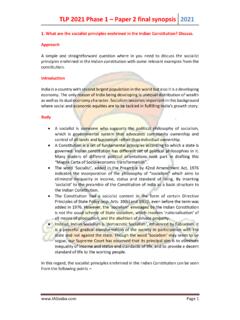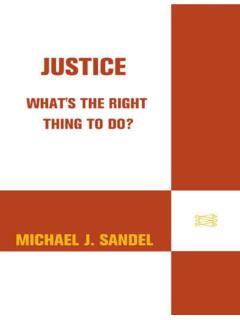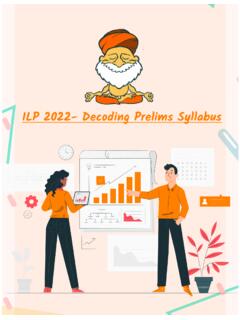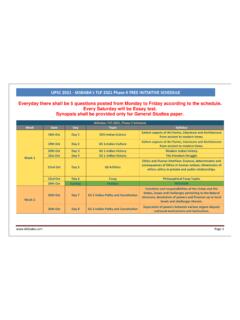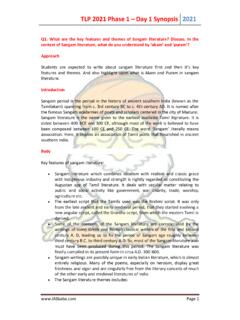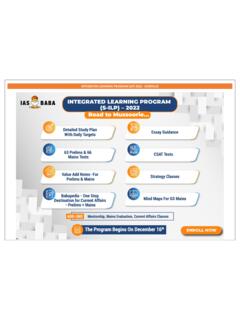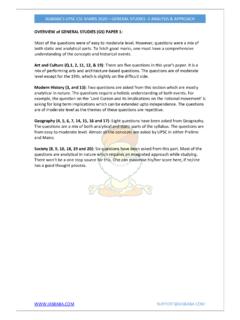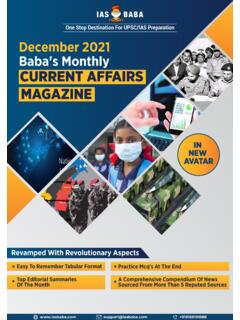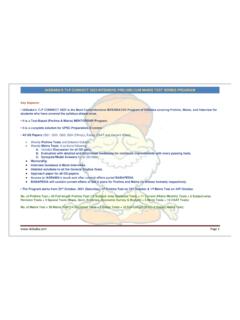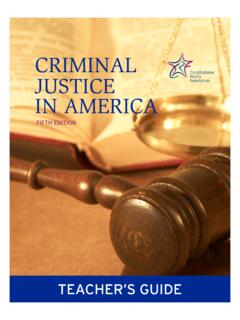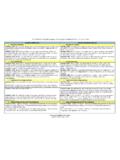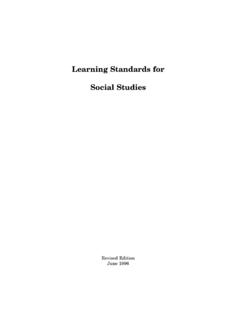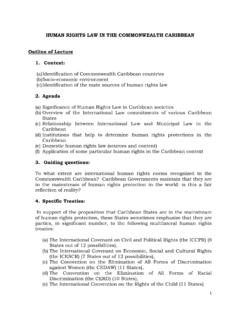Transcription of UPSC MAINS 2019: ETHICS ANALYSIS, APPROACH and …
1 UPSC MAINS 2019 : ETHICS analysis , APPROACH and REFERENCES 2019 Page 1 Dear Aspirants, We are all engaged in some or the other activity. When there is no passion attached to the activity, we call it a job . When an activity has passion behind it, it becomes joy . We have been doing one thing with great passion and dedication for the last 5 years. Yes! We love to guide civil servant aspirants. We have dedicated ourselves into creating an ecosystem that gives even a person sitting in the remotest corner to crack the prestigious civil services examination with Rank-1. In this process, we have developed, designed and dedicated a series of initiatives for civil services preparation. The quality of these initiatives have been proven time and again. It has become the norm to have high hit ratios in Prelims and MAINS from the initiatives of IASbaba, namely Integrated Learning Programme (ILP) and Think Learn and Perform (TLP).
2 This article is not to boast about the HIT RATE of our initiatives in any case. It would be an injustice to say that these many questions, directly or indirectly came from our initiatives using keywords of the UPSC questions. In that way, if we frame questions over the year on all keywords in UPSC syllabus our hit ratio will be 100%. However, you are smart enough to analyse the importance of our initiatives and its very close resemblance to actual UPSC papers. Rather than numbers focus on its significance and make it a part of your preparation. You should work on the smart study and smart thinking to keep your inputs minimum and maximize the output. Below we have come up with the analysis and APPROACH for each question of ETHICS General Studies (GS) Paper 4 that was asked by UPSC along with the links and references of IASbaba questions/ articles.
3 Needless to say- if you are regular with the initiatives of IASbaba, your chances of clearing the most coveted examination of India is really high. We at IASbaba are expecting bigger and better results this year!! UPSC MAINS 2019 : ETHICS analysis , APPROACH and REFERENCES 2019 Page 2 General Studies 4 ( ETHICS ) Overview The pattern of the paper remains the same as previous year. Section-A is for 130 marks and Section-B consisting six case studies is for 120 marks. Regarding Section-A The marking pattern in Section-A remains the same. Question number 6 has three sub questions which are quotes given by moral philosophers/thinkers which is on similar lines of the previous year question paper. Many of the questions in this section demands only a basic understanding of the terms mentioned in the syllabus.
4 However, many questions have two parts, with the second part generally demanding the application of the understanding. Regarding Section-B The length of the Case Studies is smaller compared to the previous year. Only in one case study the examiner is asking about the options available. Most of the case studies demand for suggesting some measures with respect to the major issue in that particular case. This requires a strong hold on the Syllabus. For example, if we see the last case study (Q12), the case mentioned above will not help much in answering the questions given below. Inorder to answer these questions, we need to know the institutional measures regarding the issues mentioned. Similarly, is asking about the consequences of politicization of bureaucracy.
5 This cannot be answered just by reading the case study. It requires prior knowledge on the same. Even in the second part of the question needs to be answered with prior knowledge. Like measures to be taken to ensure that honest civil servants are not implicated for bonafide mistakes on their part. To sum up, we can say that UPSC is checking your theoretical knowledge and solution oriented bureaucrat by explaining the context of the question in the case studies. UPSC MAINS 2019 : ETHICS analysis , APPROACH and REFERENCES 2019 Page 3 Q1. (a) What are the basic principles of public life? Illustrate any three with suitable examples. (150 words) (10 marks) LINE OF THOUGHT/ APPROACH : This question asks about the principles one should follow in public life.
6 Here, you need to explain in brief the principles of public life like Selflessness, integrity, objectivity, accountability, openness, honesty, leadership. Then pick any three among them and explain with examples. Example: Integrity: Abdul Kalam has borne travel expenses (to come to his swearing in ceremony) for his family in his personal capacity. Honesty: Shanmugam Manjunath a sales officer (grade A officer) for the Indian Oil Corporation had performed his duty honestly by sealing a corrupt petrol station in UP for selling adulterated fuel, though it led to his murder later. Leadership: Armstrong pame leading the way in constructing the 100km road. IASBABA REFERENCE: ILP VALUE ADD NOTES- ETHICS - An APPROACH ILP MAINS Mock UPSC MAINS 2019 : ETHICS analysis , APPROACH and REFERENCES 2019 Page 4 UPSC MAINS 2019 : ETHICS analysis , APPROACH and REFERENCES 2019 Page 5 Q1.
7 (b) What do you understand by the term public servant ? Reflect on the expected role of public servant. (150 words) (10 marks) LINE OF THOUGHT/ APPROACH : This is a direct question on the role of public servant. Here you need to define the term public servant in Introduction. Then in body part, mention role of public servant in detail with examples. A person who works for the government (Centre, State, Local) such as a teacher, IAS officer, police officers, Judge etc is known as a public servant. A public servant values public good over his/her personal interests. UPSC MAINS 2019 : ETHICS analysis , APPROACH and REFERENCES 2019 Page 6 A public servant while performing his role should exercise certain values like accountability, integrity, honesty, committed to service, effective implementation of policy, leadership, service delivery, empathy towards the vulnerable section.
8 Example on the expected role of civil servants: Rajni Sekhri Sibal (ex-Director of Primary Education) was transferred for not cooperating to change the results of JBT (JBT teachers recruitment scam) . Being committed to service and possessing the values of honesty and integrity, she has made sure that no one can tamper with the results. SR Sankaran (foundly called as People s Officer ) possessing the values of empathy and compassion strived towards abolition of bonded labour. IASBABA REFERENCE: ILP VALUE ADD NOTES- ETHICS - An APPROACH ILP MAINS Mock UPSC MAINS 2019 : ETHICS analysis , APPROACH and REFERENCES 2019 Page 7 Q2. (a) Effective utilization of public funds is crucial to meet development goals. Critically examine the reasons for under-utilization and mis-utilization of public funds and their implications.
9 (150 words) (10 marks) LINE OF THOUGHT/ APPROACH : The question is about leakages and corruption in expenditure management. You need to address why effective utilization is crucial to meet development goals. Address reasons for under- utilization and mis-utilization of funds and their implications. Then Conclude by giving the measures for the same. Reasons- corruption and leakage, reckless and wasteful expenditure, high revenue expenditure, lack of scientific APPROACH . UPSC MAINS 2019 : ETHICS analysis , APPROACH and REFERENCES 2019 Page 8 Example: Under-utilization: In the year 2015-16, out of a total grant of Rs 9,000 crore that was made available for modernisation of Police Department, states utilised around Rs 1330 crore (14%) Mis- utilization: Department of north eastern region - Misuse of Rs 900 crore in Arunachal Pradesh through various centrally sponsored schemes related to non-lapsable central pool of resources (NLCPR) and North Eastern Council (NEC) According to a report, 56% of Beti Bachao, Beti Padhao (to address the declining child sex ratio and women empowerment) funds is spent on advertisement and only 25% used for actual work.
10 IASBABA REFERENCE: Wrongful utilisation of public funds is a serious concern in governance in India. Examine the structural and institutional factors leading to this problem. What measures have been taken by the government to address this problem? Discuss (TLP Plus/Offline 2019 ) Examine the challenges in the efficient utilisation of public funds in India? How are those being addressed? (C2C/TLP Offline Test-15) Q2. (b) Non-performance of duty by a public servant is a form of corruption . Do you agree with this view? Justify your answer (150 words) (10 marks) LINE OF THOUGHT/ APPROACH : The question is asking you whether non-performance or not doing one s duty by public servants is a form of corruption? In the introduction, define corruption (monetary and non-monetary misusing the power of authority to favour any person/party).
